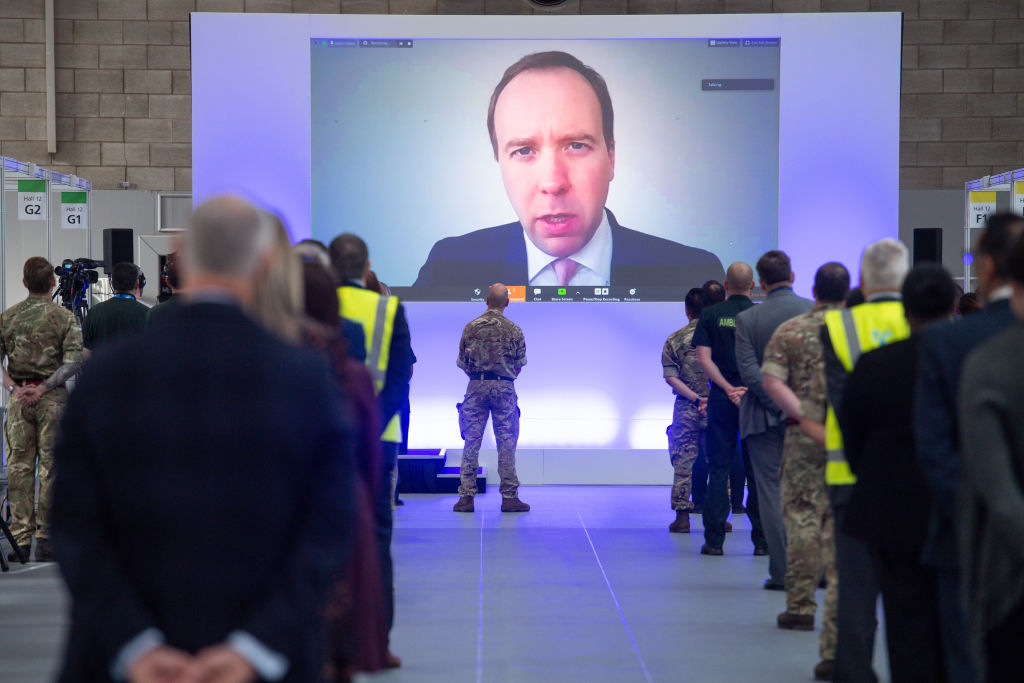London
I am a type. I don’t like groups. I maintain few memberships. I question and resist authority, especially enforcement of rules for rules’ sake. I’m leery of orthodoxy. I hold back from shared cultural enthusiasms.
Everyone’s met such obstreperous specimens — the original self-isolators — and some readers out there are just like me. We’re irksome in emergencies, when the police want the crowd to evacuate and we insist on knowing why. We sometimes spite our own faces; many of us still haven’t seen Hamilton (and now we can’t). We don’t joyously belt out national anthems, and recently, to popular disgust, many of us curmudgeons don’t lean out of our windows each week to clap for the healthcare workers.
Still, we have our uses. Back in the day, we different drummers had no objection to gay relationships just because homosexuality was illegal. More recently, unlike 89 percent of the British public, we don’t take blithely for granted that a prolonged ‘lockdown’ of all the healthy people in a society is necessarily the most effective or intelligent approach to contagion. In short: my lot have herd immunity.
Yet you sure won’t see us on TV. One of the many disturbing aspects of this surreal period of viral suppression — indistinguishable from social repression — has been the media’s lockdown lockstep, especially the startlingly homogenized viewpoints espoused across the networks. Unsurprisingly, given my little addiction problem in the most tranquil of times, in the past month I’ve overdosed on news. Albeit seldom, I do read the odd outlier in newspapers and magazines raising a nervous hand to say, ‘Er — is all this lockdown really a good idea?’ But in both British and American broadcast news — CNN, PBS, the BBC, Sky, ITV, Channel 4 — we almost never hear from the numerous epidemiologists who regard the stay-at-home policy as scientifically unjustified.
A rare Peter Hitchens appearance on Good Morning Britain aside, we’re never reminded that a high proportion of coronavirus ‘linked’ fatalities involving serious underlying health conditions might otherwise have been folded into expected annual mortality, or what poor-quality statistics governments are keeping (dying of vs with). In coverage of a pandemic vastly more lethal for the over-seventies, long news packages mostly mourn uncommon deaths amongst the young. Even pro-Dem CNN allows Trump to cite the die-in-the-sky threat of 2.2 million American fatalities without questioning what arbitrary or as-yet unknowable inputs produced this sensationalist potential death toll.
Broadcast media is caught up in a disaster movie on the wrong side of the screen. All that matters is the terrifying, relentless rise of total deaths. On a narrative level, any distraction from the plot of our nail-biting feature is the enemy: any information that might mitigate the building horror of a bravely unified nation, any guest who injects a sense of proportion, any interviewee who refuses to join the mass denunciation of ‘murderers’ failing to adhere fanatically to government restrictions. We’re supposedly in a war, so we’re hardly going to put the enemy on television. Contrarians risk accusations of treason. Government and the press are in league. Little wonder it’s become so challenging to locate dissenting voices anywhere.
The supine capitulation to a de facto police state in a country long regarded as a cradle of liberty has been one of the most depressing spectacles I’ve ever witnessed. In a matter of days, busybodies are ratting on neighbors for going for a run twice; these people would have been pigs in shit in communist East Germany. The police taping-over of isolated park benches and harassment of sunbathers or sea-swimmers without a soul within 100ft have no basis in epidemiology. I hate to say it, but one weakness of this polity is a belief in law purely because it is the law, and Britons too readily allow the purpose of a law to become dislocated from the-law-is-the-law-is-the-law.
Frankly, the government has succeeded all too horribly well. The British have bought the lockdown hook, line and sinker. Petrified by the prospect of looking callous while innocents continue to die, politicians are now trapped by their own propaganda. Now that the public are so attached to their incarceration, the mission of this beloved lockdown has been encouraged to creep. Originally we were to stay home to save the health service — to keep it from being overwhelmed and to provide it with time to expand capacity. Job done. Now we’re instead trying to stop spreading the virus — which it looks as if we’ll all get anyway — to save lives. But if we wait to lift these fascistic restrictions until fatalities return to zero, we will not have ‘inessential’ retail, theaters, businesses and factories for years — if ever.
Astonishingly, a whole faction of Boris Johnson’s cabinet wants to entrust the determination of when to lift the lockdown to public opinion. Now that the people have learned to embrace their own humiliation, captivity and impoverishment, presumably the public will let the government know when they’ve finally decided they would like to leave the house.
But who inculcated that public opinion in the first place? Government! All those grim public health adverts with the hectoring texture of the 1950s! The public have been brainwashed once, and the sole upside of their proving so pliable is that they can be brainwashed right back again. That’s what we call leadership — if a rather sorry version.
***
Get three months’ free access to The Spectator USA website —
then just $3.99/month. Subscribe here
***
I’m usually pretty cynical about this often-impotent British method of reckoning, but when this is all over we deserve an inquiry — conducted by independent scientists who have not attached their reputations to any policy or prediction. The state is now invested in its lockdown, which government will undoubtedly credit for any decrease in infections, regardless of the truth. We will require the truth. We cannot install nationwide suffocation as the standard parliamentary response to any new illness.
We’ve little evidence that putting a plastic bag over a whole country is epidemiologically sound. So we will want proper professionals to extrapolate exactly what this bandwagoning hysteria accomplished aside from economic ruin.

























